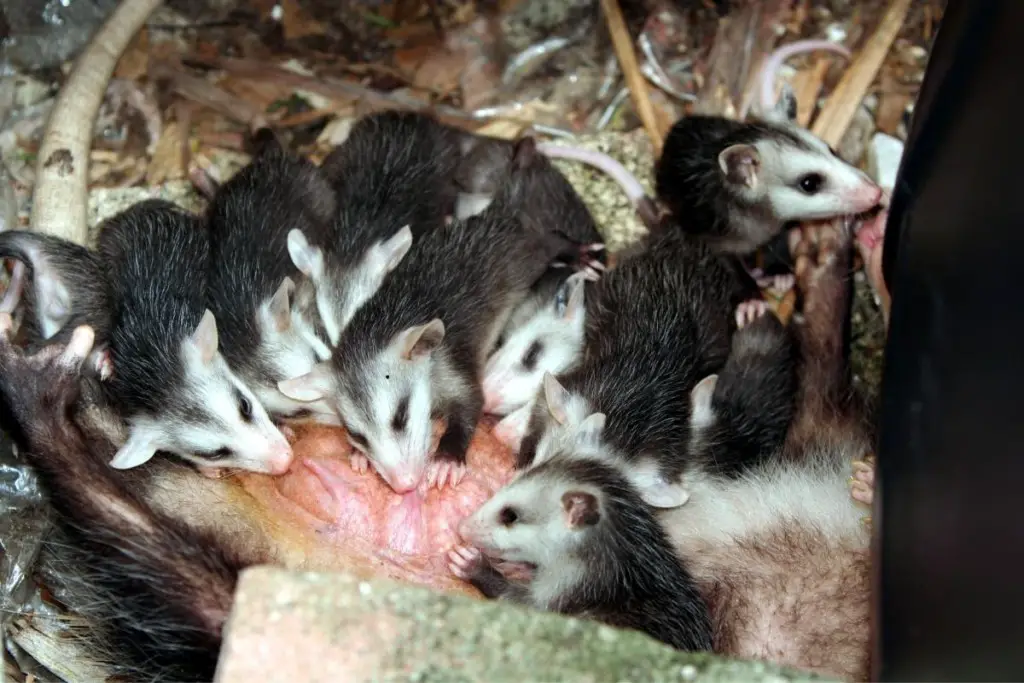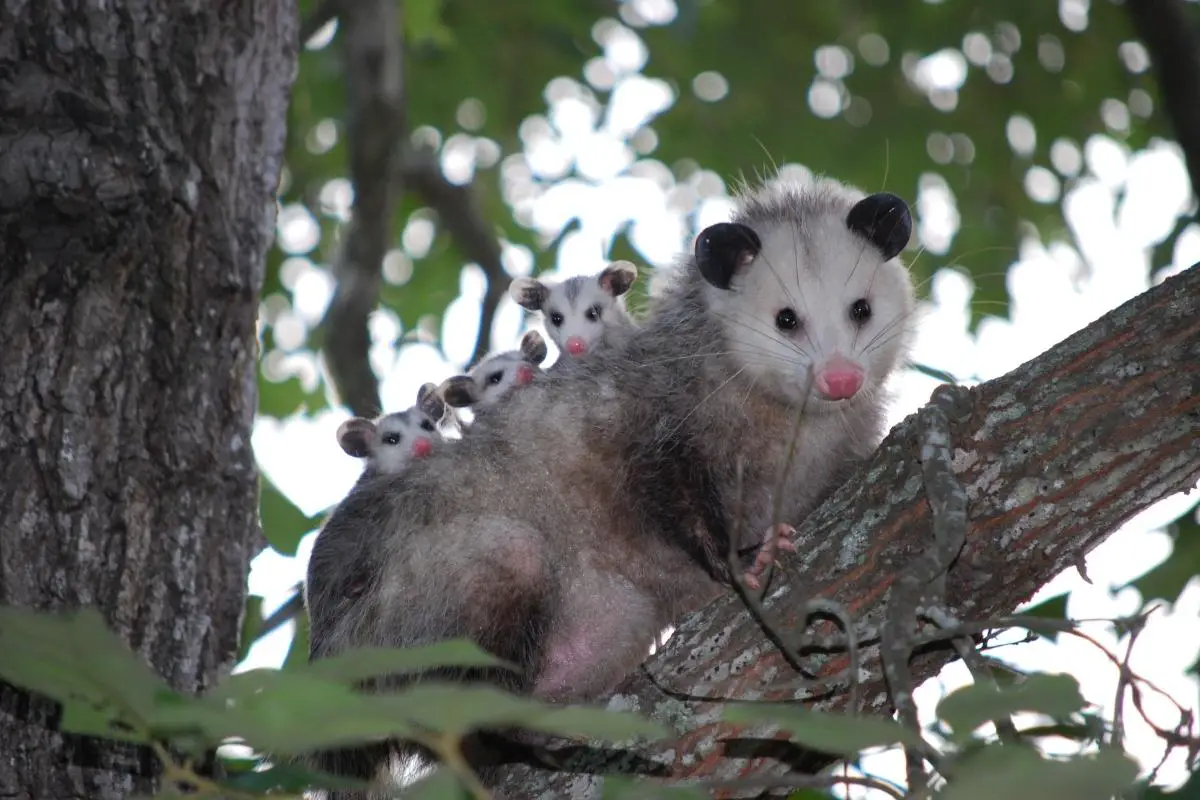Opossums are known for having large litters after mating. They can rapidly reproduce and have a very short gestation period when compared to most other similar wild animals. Most opossums mate and give birth to their babies in the early portions of the year.
What Are Baby Opossums Called?
Baby opossums are called joeys. Female opossums can give birth less than two weeks after they mate with a male opossum. Females start breeding in January and can give birth to multiple litters of babies in the same year. The breeding season comes to an end around May or June and won’t resume until about January of the following year.
Opossum babies face a harsh reality from the moment they are born. Female opossums can give birth to more than a dozen babies in a single litter. The sad reality is that only a small percentage of the babies will survive. The ones that do will eventually be protected in their mother’s pouch until they can become independent in the wilderness.
Opossum Breeding Season
It’s rare for opossums to give birth to babies outside of their breeding season. The normal season for opossums runs from as early as January through late June. During this time, female opossums can breed up to three times and give birth to a large number of babies.
It’s rare for female opossums to give birth outside of the breeding season, but it can happen. If temperatures start dropping around November or early December, some female opossums may start breeding during this time and give birth to a litter of babies before January. Opossums communicate to their babies by making clicking noises, in return, the babies make sneezing noises.
See our article What Does an Opossum Sound Like
Litters of Opossum Babies
It’s common for opossum mothers to give birth to a large number of babies. The average litter size for an opossum is around eight or nine babies, but it can be as few as five. Larger litters can have more than a dozen babies, although a large number of them likely won’t survive.
Baby opossums may be protected by their mother’s pouch, but they will face challenges until they learn to become independent in the wilderness. Their odds of survival go way down if their mother dies at any point during their young age.
It can take around three months before baby opossums are capable of taking care of themselves. During these three months, they will learn about all of the survival skills that they need to utilize in the wilderness. This will include scavenging, finding shelter, and hunting for food.
Opossum babies stay in the pouch or ride on their mother’s back to learn different skills. As they slowly grow up, they adapt and learn how to use their own senses. It’s a slow process, but after a few months, most baby opossums will be ready to survive in the wilderness without their mother.
Opossum Babies in Pouch
Opossums are marsupials, that carry their babies in a pouch. The word marsupial comes from the Latin ‘marsupium’, which means “pouch.” The point of the pouch for the baby opossums is to keep them safe while they feed and suckle on the teets.
Nature is a vicious place and baby opossums are in the most danger when they are left alone. Just about any predator that is larger than an opossum is going to find a nest full of possums to be an opportunity to eat. As they stay in their mother’s pouch, they will remain protected, while learning how to survive. This is crucial for opossum babies in pouches.

Baby Opossum Size
Baby opossums are very small. They are around 1/2 inch long and about the size of cashew, or in reference, the size of a small baby mouse. When they are born, there can be as many as 12 – 20 joeys. These little baby opossums will then crawl into the mother’s pouch.
This is where the real struggle begins. There will only be enough nourishment for of few of them to survive and the mother only has 13 nipples. This is when nature starts to decide who gets to make it and who doesn’t. Some joeys will fall out of the pouch, others will be the runts and get left out of feeding. Source.
How Long Do Baby Possums Stay With Their Mother?
Opossum babies will stay in their mother’s pouch for about two months after birth. After this eight, or nine-week period, most opossum babies start riding their mother’s back for the next several weeks.
After about three months, these young opossums become independent. They become mature after six to eight months. At this point, they can start breeding and will usually do so during the next breeding season.
Most baby opossums will never reach their age of maturity. In many cases, the mother of the baby opossums will be killed and the babies will never have the opportunity to learn the important survival skills that are needed in the wilderness.
Others will fall off of their mother’s back or get lost in some other way. Some opossum babies will also eventually be hunted and killed by harmful predators. The small percentage of opossum babies that do survive will likely go on to have babies of their own as soon as they mature and find a mate.
Since lifespans for opossums are fairly short, new generations of opossums can be created in only a few years. This rapid breeding cycle for the opossum species is just one reason that population numbers continue to remain stable for opossums.
See our article for How Long do Opossums Live here.
Related Questions
What’s the average litter size for an opossum?
Ten babies in a single litter would be slightly above the average for a litter of baby opossums. As mentioned above, opossums can give birth to as few as six possums or more than a dozen in a single litter.
When do baby possums become mature and start breeding?
It would be impossible for baby opossums to breed before they reach their age of maturity. This occurs after about seven months of age. During this transition period, female and male opossums will look to find their first mate as soon as the next breeding season starts in January.
- Hero Farm Dog Survives Epic Battle with Coyote Pack - December 9, 2024
- The 10-Minute Bedtime Routine That Changed My Dog’s Sleep Forever - November 29, 2024
- Creating a Safe Space for Nervous Pets: Your Guide to Pet-Friendly Havens - November 25, 2024

